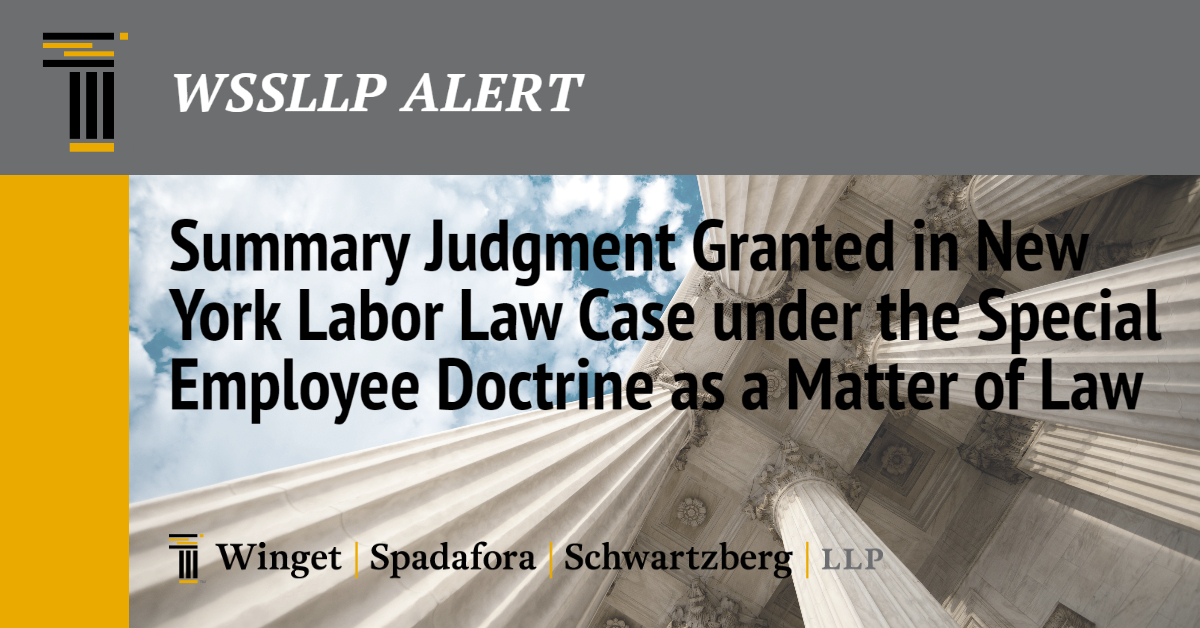At the outset, our primary concern at this time is for everyone’s safety and health given the COVID-19 epidemic. It certainly is a new world for everyone. All of our offices are fully up and running remotely, and we are ready to address any needs you may have. Please stay safe.
Shortly before the COVID-19 outbreak, we had a great success in a New York Labor Law case which we thought you might find to be of interest. In that case we obtained summary judgment in favor of our client, a general contractor. We prevailed by arguing that that New York’s Workers’ Compensation Law barred a claim against our client. The claim against our client was brought by an employee of a staffing agency.
In our recent case, we represented a family owned Florida-based construction general contractor. The contractor was engaged in renovations of retail store franchises. Our client was hired to renovate a store in Nassau County, New York. Our contractor had its site manager at the job site to supervise the construction work. For some of the work, our client utilized a staffing agency. In our case, our client hired the plaintiff, a temporary laborer, who was assigned to help bring deliveries of pieces of sheetrock into the building. Plaintiff in our case was at his first day on the job.
Plaintiff claimed that he tripped and fell, injuring his back and knee. He underwent surgery on his knee, as well as spinal injections. Plaintiff brought claims under New York’s Labor Law, Section 241(6). This section places duties on owners, general contractors and their agents. Labor Law Section 241(6) requires these parties to provide a safe and reasonable job site wherever construction, demolition or excavation work is done. Plaintiff complained that there was debris on site that caused him to trip.
The evidence established that our client was exclusively in control of the Plaintiff, a temporary construction laborer, though his employer was the staffing agency. Indeed, the staffing agency was his employer, or more accurately, an employer. Our general contractor client was also an employer. We argued that our client was a special employer, while the staffing agency was his general employer. We further argued that this provided our client with an absolute defense based on the Workers’ Compensation Law bar of suits against one’s employer for accidental on-the-job injuries.
The Court agreed with our argument and granted summary judgment in favor of our client. By contract with the staffing agency, our client agreed that it would be responsible for supervising and directing the staffing agency’s workers. The contract also provided that our client could dismiss workers such as the Plaintiff if not satisfied with their work. Plaintiff was able to obtain workers benefits through the staffing agency. It was clear that our client directed and controlled Plaintiff’s work.
In dismissing the claims against our client, the Court agreed with our arguments based on the Court of Appeals case of Thompson v. Grumman Aerospace Corp., 78 N.Y.2d 553 (1991) which provides that “a general employee of one employer may also be in the special employ of another, notwithstanding the general employer’s responsibility for payment of wages and for maintaining workers’ compensation and other employee benefits.” Though adjudication is usually an issue of fact, the Court in Thompson noted that it is “…recognized as an exception to the general approach and analysis … that the determination of special employment status may be made as a matter of law where the particular, undisputed critical facts compel that conclusion and present no triable issue of fact.”
In our case the trial Court followed the exception to the general approach, and dismissed the complaint against our general contractor client on a motion without the need for a trial. We were able to obtain dismissal after just plaintiff’s deposition was held, without the need for our client and co-defendants to be deposed, saving our client defense costs and the need to travel up from Florida to be deposed.





